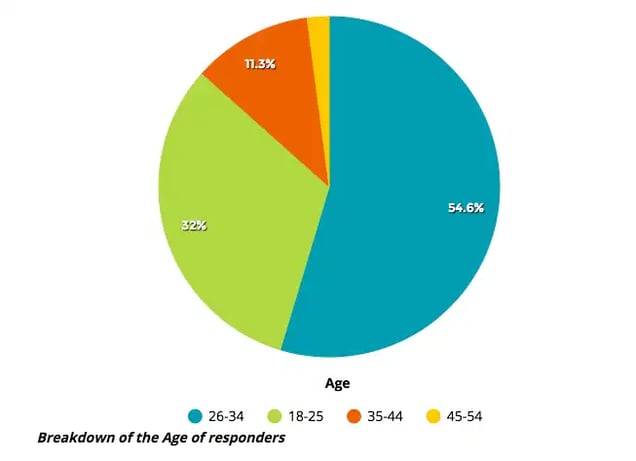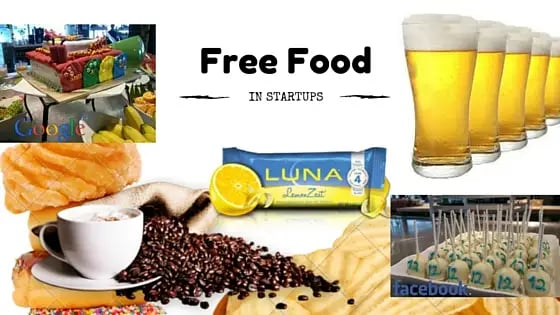Free coffee, donuts, and unlimited fro-yo are some of the sweet perks that startups offer their employees. It’s a nice way to show the team they’re appreciated, and an insidious trick to make sure they never leave the office.

But this affects more than morale, namely employee waistlines. We’ve all heard of the Freshman 15, the infamous weight gain that happens at college due to an overdose of beer and pizza. But now there’s something called the Google 15, the number of pounds gained when working at startups.
The earliest use of this phrase we could find was in 2004, on CNET.
But that was over a decade ago, and with a health conscious millennial generation moving in — and perks often including free gyms, personal training, and healthy snacks — is the Google 15 still a thing today?
To find out we asked over 100 startup founders, employees, and tech workers about their lifestyle habits, weight gains or losses, and whether their company tried to help them with this. Here’s what we found.
Now let’s dig into the data
A resounding 69.07% of responders told us they’d gained weight since starting work. But this high number is due, in part, to the rise of sedentary work activities in general across developed countries. Science journal PLOS ONE researched weight gain in the workforce and found that what’s happening to our waistlines is a direct result of an increase of computer skills.
In the 1960s, around 50% of Americans worked roles that involved ‘moderate-intensity activity, such as agriculture, construction, and manufacturing.’ Today this accounts for less than 20% of the workforce. This is why obesity has become an issue affecting 65% of the population; almost two-thirds of Americans are overweight or obese.
Based on physical activity, researchers say that people today need 100 fewer calories than they did 50 years ago, but their actual calorific intake has risen, with the average daily calorie intake now 2500.
At first glance these numbers don’t look too bad: 22% had no gain and 31.7% gained a minimal amount. But when you realize that the rest gained the equivalent of a small baby (or three), then it starts to be worrying.
Studies show that gaining a pound a year (once you hit 20 years of age) is normal. But almost half of our respondents are beating ‘normal’ and that suggests an unhealthy outlook in the long-term. Sure, we can take into account that this weight gain may have taken place over a period of time, but given the young age of our respondents and their careers (for example, startup Zenefits is less than 2-years-old) we can figure the weight gain happened quicker than average.

Age of responders
Most of our responders qualify as millennials. Over 86% fall into the 18-34 age group. This is not a huge surprise; Silicon Valley and it’s New York/Austin equivalents are famous for hiring young. Data from Payscale highlights this, as the average age of an Apple employee is 31-years-old, 30-years-old at eBay, and 29-years-old at Google.
In contrast, the average employee ages at legacy companies are generally a decade higher than startup industries. Payscale reported that the average HP employee is 40-years-old, 41-years-old at Kellogg. Co, and 42-years-old at Campbell Soup Company.
At Kodak Co. the average age is 50.. and we all know what happened to Kodak. Tech and startup lifestyles reward youth, and millennials are often the only people who can cope with the demanding lifestyle.
![]()
Free food on offer
76% of employees receive some form of free food at the office. But this isn’t just because the companies are nice. Technology Advice reported that 56.1% of employees highly value perks, and a happy employee is one who stays with the company.
On average, it costs around 30-50% of an entry level employee’s salary to find a replacement when they leave. For mid-level this rises to 150% and for high-level we’re talking 400%, according to Forbes.
Breaking down the numbers, that would be $16,000 to replace a $40,000 salaried employee, and $120,000 to replace someone earning $80,000. So some free food is a small price to pay.
In fact, a good food culture can create a cult in itself, like Facebook Culinary team’s webpage, which showcases upcoming meals on campus… and has over 87,000 likes.

Here’s what some of them get:
- Chips, baked goods, Luna bars
- Free lunch on Fridays (restaurants or catering), snacks (our choosing, we order a mix of healthy stuff and like goldfish crackers… )
- Smoked salmon, bagels, cream cheese, avocado, nuts, fruit, Popchips, candy, hummus, hard boiled eggs.
- Daily catered lunches – sushi, Indian, Greek, salad bar, etc.
- Coffee, beer.
Company health benefits
We thought we’d entered a new health-conscious climate, but our survey revealed that 55.8% of companies offer no help at all. Out of the remaining 44.2% the feedback was mixed. Some said their companies were great and offered yoga classes and massages.
Others contributed partly to gym memberships, anywhere from 50-80%, though some employees mentioned they felt this was for “tax purposes” and not for their welfare.
“For sure, the company helps you achieve your goals. Whether it’s to gain or lose weight, or to learn new physical skills (i.e., rock climbing, boxing, etc), this is usually comped, along with many free meals (even though we’re a fully remote organization).”Anonymous Employee, Nashville
“No help. Our executives are not fit and don’t care about eating healthy. If they don’t prioritize it then our company won’t.”Anonymous employee, San Francisco
Considering that 76% of companies feed their employees, it’s odd that they don’t put as many resources into keeping them healthy. After all, a sick employee won’t bring the company value up.
Reasons techies gave for their weight gain
These varied amongst individuals but a few things were repeated over and over.
- Long hours, stress eating, heavy food, and bad sleeping
- There is lots of junk food
- Lots of snacks, too tired to go to the gym
- My long commute, catered lunches, and long hours
- Not enough exercise, too much drinking, all the snacks
We’ve just handed you a lot of data to absorb, so we thought we’d break this down into a more personal note. Here are some fake profiles we’ve made using the data collected. Recognize anyone here?

Weight Gain: 12 pounds
Reason: Shitty eating, no exercise
Works out?: No
Fitness benefits?: No

Weight Gain: 18 pounds
Reason: I think this is because my metabolism slowed down. My exercise and eating habits have always been pretty terrible.
Trying to lose weight?: No
Works out?: No
Fitness benefits?: No

Weight Gain: 13 pounds
Reason: We have catered lunch and dinner every day… and not moving due to emails.
Works out?: Twice a week, spinning
Free food at work?: Yes, can order what you like for lunch and dinner. Get breakfast twice a week, plus snacks and unlimited alcohol.
Fitness benefits?: We have a free gym.

Weight Gain: 4 pounds
Reason: I sit most of the day and don’t move about.
Works out?: No
Free food at work?: Every Wednesday or Thursday the company gets either donuts, cookies, or pizza. Not to mention the tons of Cokes, Fantas, and fizzy drinks in the fridge and random biscuits people get!
Fitness benefits?: Discounted gym membership
The Hustle’s takeaway
Companies, especially in the startup world, love to pretend that they’re your friends. They have shiny offices with lots of freebies, cover you with branded t-shirts, and tell you that you’re making a difference.
But this chummy behaviour is exactly what creates the long hours and high-stress environments where you try to achieve crazy deadlines and hit all your targets. Notice how 76% of companies give you food, but only 55.8% help you keep fit.
Startups prioritize dishing out free food over caring for the physical health and well-being of their employees. The startup/techie lifestyle is designed to make you gain weight by encouraging sedentary behaviour (don’t leave your desk) and fuelling you with high-carb, sugary snacks.
You’ll be bank rich, but body poor. The choice is yours.

